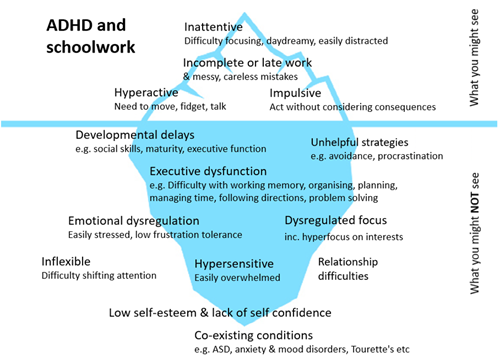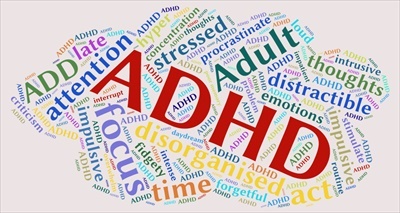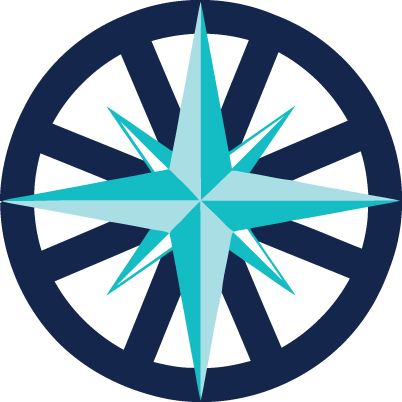ADHD Self Help
Self help for ADHD: practical strategies to help you cope with Attention Deficit Hyperactivity Disorder - and all the problems that come with that.
Print or save this page as PDF
The information on this page relates mostly to adults and teens.
Attention helps us to concentrate and focus on what we want and need to do. Some of us experience problems in maintaining our focus on most things, but maybe also have the ability to focus REALLY well and for long periods of time on things or activities which really interest us.
Adults and young people with ADHD can therefore struggle in several key areas, as a result of a neurobiological imbalance which itself arises mostly due to genetic factors. These difficulties can impact on our mental health, causing stress & frustration, anxiety, depression, and low self esteem. Individuals with ADHD may also experience relationship difficulties, debt, and can also have a vulnerability to substance misuse.
However, the news isn’t all negative! There are thought to be many positive factors to ADHD, including high energy, creativity, innovative thinking, high motivation, the ability to hyper-focus. Many celebrated innovators of past and present are known or thought to have or have had ADHD.
The symptoms in girls or women can vary substantially from those experienced by boys and men, with girls being quieter, and having less hyperactive symptoms, but maybe more inattentive and thought of as “daydreamers”. The problems are often much less likely to be noticed or addressed.
In spite of these challenges, it is possible to learn techniques to help us deal more effectively with every day events and lead successful lives. Use these techniques as you need to. For instance, if you don’t impulsively spend money, and have no financial concerns, then you can ignore the section on “budgeting”.
Thinking Differently
STOPP
Is this (thought) fact or opinion?
This is the ADHD talking - just because I have ADHD doesn’t mean it has to be this way... I can make wise choices about how I react…
What advice would I give a friend about this? What advice would a trusted friend give me? What’s the bigger picture?
Don’t believe everything you think! Thoughts are just thoughts
Be understanding and compassionate to yourself, rather than self-critical (see self esteem).
For help with other problems, please visit this page the Self Help page and click on these links:
Depression,
Anxiety,
Anger,
Stress,
Low Self Esteem,
Substance Misuse
Attention Training
The brain is “plastic”, or able to develop and change – think of it as being like a muscle. The more we stretch and use it, the stronger and more flexible it will become.
Attention training exercises, or using mindfulness, can help us improve our ability to focus or hold our attention for longer periods of time, help us improve our listening skills, make less careless mistakes etc.
Breathe
Set aside a short time to just notice your breathing. You don’t have to change your breathing in any way, just to notice it. Noticing sensations of breathing in your chest and belly. Other thoughts and distractions will come to mind, that’s ok. Just notice when your attention has wandered, then gently bring your attention back to your breath.
Mindful Activity (see below for NOW and Mindfulness).
Do any everyday activity or exercise mindfully, such as walking, eating, showering. E.g. when washing up, notice the temperature of the water on your hands, the sensation of the crockery, the bubbles.
Notice the sounds of the washing up, including the bubbles! Notice any smells, notice the way your hands and arms feel and move, and your spine and body as it supports you etc.
Meditation and Mindfulness training.
Make it part of your daily routine. You can gradually increase your meditation time every week – start small and build up slowly.
The Iceberg model of ADHD - at school (but also relevant in other situations)

Attention Exercises
Set a timer for 5 minutes (increase by 5 minutes a day) and focus your concentration on one activity. Take a 2 minute break before continuing (increase break by 2 minutes each day).
- Memorise information such as poems, quotes, jokes or words of a new language.
- Counting exercises: count backwards from 100 in 1s, then 3s, then 7s.
- Use your senses – focus on each sense in turn and think about what you can see, then hear, then touch, then smell and/or taste.
- Go through the alphabet thinking of countries, towns, boy’s names etc for each letter.
- Visualisation exercises - Combine deep breathing with imagining successfully doing something with the ability to maintain focus of attention (e.g. at work or school), or successfully dealing with a difficult situation (e.g. conflict or anxiety situation). (Use the mp3 downloads).
Attention Training Exercises For Children
- Play music statues – freeze for 10 seconds, then gradually increase (can take turns of parents being the statue)
- Puzzles, colouring, painting etc. May need to make a race or competition to e.g. finish first or use most colours
- Board games – when child’s turn, pause a little more
- Coin game – create a pile of assorted coins, cover with cardboard sheet, use timer. Choose 5 coins from pile and put in sequence, asking child to look carefully, then cover. Set the timer, and ask child to create the same sequence. Repeat until done correctly. Increase difficulty (number of coins) gradually.
- Simon Says game
- Kim’s Game – memory game using tray of objects. Remove one object each time and ask child to identify the missing object.
- Picture puzzles – ask child to find hidden objects
Word games
Doing Differently
- Plan for success every day
- Set small achievable goals every day
- Reward yourself or tick them off at the end of the day
- Set goals for each problem area – break each goal down into smaller steps
Identify problem areas
Make a list of all the areas in your life that need changing, perhaps using broad headings e.g. home, work etc.
Prioritise
Decide which of those problem areas on your list are the most important or most urgent. Do the most important item first.
- Identify the problem.
- Break the problem down into smaller steps.
- Brainstorm possible ideas.
- Consider pros and cons of each possible solution.
- Choose one solution that looks most likely to help with fewest
disadvantages. - Plan out step-by-step what you need to do. Consider what resources or help you need.
- Do each step!
- Review how it went. Did you achieve your goal? What did you learn. What could you do differently?
Improve Organisation
- Use a large clock
- Create more space
- Identify which items are necessary and discard or store other items
- Boxes, folders, shelves, baskets etc (By the front door for work or school items)
- Important items – keys etc
- Stationery
- To do – bills, homework etc
- Wall calendar (or smartphone/computer calendar)
Weekly events e.g. evening class
Special events
Appointments, exams, assignments etc - Use a whiteboard or messages on the fridge for reminders / to do lists
- Prioritise what needs doing, when. Do the most important thing first, then the next important
- Use different lists for different areas of life, or break down into smaller lists
- Daily routine / chore chart & tick off completed activities
- Check school / work bag
- Pet care
- Household chores
- Deal with post, calls etc as they come in rather than leaving for another time
Budgeting - Budgeting Worksheet
Make a list of all your weekly/monthly income, and all your expenses for the same period – approximate as closely as you can e.g. food, fuel, divide quarterly bills by 3 (monthly) or 13 (weekly) etc. You may choose to keep receipts or a diary, study bank statements etc. for one month to find this information.
Subtract expenditure from income to see how much is left over (or how much of a deficit you have).
Assess how you can make savings in particular areas, then plan how to make those savings
Write out your weekly/monthly budget
It can be helpful to write down your daily spending to help you keep track. Some people find it helpful to put a weekly allowance into separate tins (purses etc).
Pay bills online or via regular payments (direct debit or standing order)
Online banking helps reduce need to check through paperwork to balance books
Set up notifications on your bank account so you receive a message when your balance falls to a certain level
Many companies or banks offer “non paper” billing to help reduce post.
Create one folder/box for receipts. Once a month, sort them into recycling or put those you need to keep in an envelope and label with the month/year.
Manage impulse spending
Use cash only – leave cheque book or cards at home
Use only one credit card (destroy/cancel all others)
Use a shopping list and stick to it
Use a calculator (on your phone) to tally your purchases on the go
Reduce online spending
Set a daily budget
Write down your spending (diagram for visual impact?)
Use only one payment method for online purchases
Change account settings on websites e.g. remove option for “one click” purchases
Remove shopping apps from your phone
Block certain websites
Block advertisements
Sell items to make money and pay the income into one account (e.g. particular paypal account for ebay selling). Then use only that account for purchases.
Time Management
- Plan ahead
- Aim to arrive 10-15 minutes early and set reminders to leave on time
- Use a watch or other timer and set reminders and alarms – perhaps 30 minutes before planned departure, 10 mins before planned departure, at time of planned departure
- If you have a smartphone, you can make use of the calendar app
- Say no to others or check diary before committing yourself!
- Allow more time than you think you’ll need - add ten minutes to every appointment or task that you think will need 30 minutes (add 20 minutes for every hour)
- Do one thing at a time
- Set an hourly reminder on your phone to let you know about the passing of time (if you have a tendency to lose time and get caught up in one thing)
Structure / Routine
- Start by timing activities to see how long you need for each one, then make a schedule for every day.
- Set times for certain activities e.g. chores, shopping, meals, getting up or going to bed
- Deal with mail and email every day – set aside a 10 minutes or so.
Act on it (e.g. pay bills)
Delete or shred it
File it (if appropriate / once actioned) - Limit time on eg. Computer (set an hourly alarm to remind you of the passing of time)
- Set up a filing system
- Different folders for different types of documents
- Use labels or colour-coding
- Make time for fun or relaxation
alone and with friends/family - Hobbies or interests
Exercise regularly
See ACE
Use weekly planner: Weekly Planner PDFor BACE weekly planner PDF
Reduce distractions
- Make a work place at home to minimise disturbances
- Desk facing the wall
- Clear desk of clutter
- Set up voice mail to answer your calls
- Turn mobile phone to silent and put it in a drawer
- Let others know you don’t want to be disturbed
- Write down any ideas or thoughts you don’t want to forget, but haven’t got time for right now. Keep a notebook or pad on your desk (or with you).
- If attending a large meeting or conference, aim to sit near the speaker and away from people who you know might distract you
- Take a break at an appropriate time. Move around – walk or jump on the spot. Activity increases our ability to focus.
Communication
- Be attentive and polite
- Repeat back important communication to check you have heard correctly
- Write things down / make notes (carry a note bad or use your mobile phone)
- Put things in your diary/calendar as soon as you hear about them
- Learn active listening skills to help you reallly listen to others talking
- Don’t interrupt others (practise if necessary)
- Use appropriate eye contact
- Ask questions rather than talking about whatever comes to mind
- Ask for a copy of any materials e.g. presentation handouts, meeting agenda
SELF CARE - Positive Steps to Wellbeing
- Make sure you get enough sleep
- Create a quiet bed time routine
- Go to bed (and get up) at the same time every day
- Avoid caffeine late in the day
- Exercise every day and spend time outdoors
- Schedule in fun, enjoyment and relaxation every day
- Eat healthily, including:
Small meals and often
Avoid too much sugar or caffeine (which can increase symptoms) - Learn to say no! Don’t take on too much. (See Assertiveness & Saying No)
Notice: Where my attention is
Observe: What I'm doing. Think: "I am walking", "I am sitting", "I am breathing", then notice those sensations in your body
Wise Mind: What now? How shall I continue? Doing or Being?
NOW: Mindfulness for Busy People leaflet
MINDFULNESS FOR BUSY PEOPLE
- Choose an activity to do mindfully throughout the day, for one, two or five minutes. For example: Drink a cup of tea. Walk. Wash the dishes.
- Whatever you are doing, be in that moment, right now. See, hear, smell, touch, feel, breathe.
- Simply notice whenever other thoughts and sensations come to mind, then re-focus on your chosen mindful activity.
- Be patient and compassionate with yourself.
- Describe - rather than judge good or bad, pleasant or unpleasant.
- It is as it is.
Everything Flows. Nothing is fixed. Heraclitus
DEALING WITH STRESS & DISTRESS
Use STOPP skill to incorporate many strategies
STOP - just pause for a moment
Take a breath - one slow deep breath
Observe - there's the mind bully again. My body and mind is reacting to the thoughts and distressing feelings.
Pull back - this is just the anxiety talking. Don't believe everything you think! Let's stick with the facts - these thoughts are just opinions (Fact or Opinion). These feelings are normal - it's just the body's alarm system doing its job, when it doesn't need to. These feelings will pass.
Practise / Proceed - What can I do right now?
I can use these strategies:
Where can I put my focus of attention right now? (Mindfulness And Mindfull Activity. What else can I do that would help me tolerate these thoughts and feelings without reacting to them?
Complete your own STOPP Worksheet
This Adult ADHD guide by Carol Vivyan & Naomi Cottam
Learn effective skills to help manage ADHD online - The Decider Skills for Self Help online course.
Print or save this page as PDF
Self Help Resources
Further Self Help Resources
Self Help mp3 downloads
NOW: Mindfulness for Busy People leaflet
Mindfulness
Flexible Thinking
Mindful Breathing
Self Help Books
You Mean I'm Not Lazy, Stupid or Crazy?!
Delivered from Distraction: Getting the Most Out of Life with Attention Deficit Disorder
The Adult ADHD Tool Kit
Mastering Your Adult ADHD: A Cognitive-Behavioral Treatment Program Client Workbook
Taking Charge of Adult ADHD




















